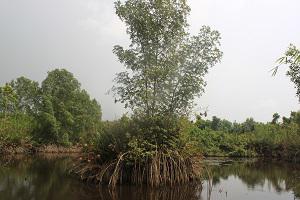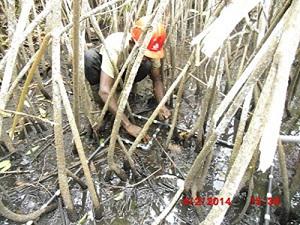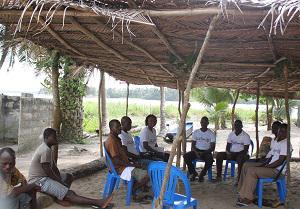Osemwegie Isimemen
The primary objective of the project is to assess the integrity and regenerative ability of mangrove vegetation along the Ébrié lagoon. It will also incorporate a study and analyses of the biotic and abiotic factors directly affecting them.

Mangrove vegetation (Rhizophora sp.), southeast Côte d'Ivoire.
Mangroves, due to their unique root structures are regarded as natural water treatment plants: lowering salinity and filtering wastes from water bodies. However, in the face of global challenges (anthropogenic activities and climate change), are these aquatic plants still able to keep up with these functions? These answers will be provided by means of an integrated study approach: mangrove habitat assessment will reveal the population structure of the mangrove forest, important value index, stand density, carbon storage potential and regenerative ability. Matured plants will be sampled systematically along transects perpendicular to the lagoon on plot dimension of 10 x 10m while, seedlings and samplings will be on plot dimension of 1 x 1m.

Counting of benthics.
Soil/water quality assessment will serve to evaluate the natural treatment ability of the mangroves, as it will provide information on the levels of contamination of the lagoon water and underlying vadose zone. The horizontal and vertical variations of the different physico-chemical parameters controlling water quality will be determined for soil and water samples. Soil samples will be collected at 10cm and 50cm depths below the ground surface while, water samples will be collected from the lagoon, directly beneath the mangrove vegetation and at 5m and 10m interval perpendicular to the lagoon.

A cross-section of members.
Socio-economic survey will furnish information on the traditional ecological knowledge and use-values of the mangroves. Household/individuals will be randomly selected from clusters (socio-cultural groups). Target respondents are volunteers from groups of traditional medicine practitioners, women, fishermen and farmers of the middle-age class and above. Data collection will be by personal interview based on questionnaires that borders on issues relating to water, sanitation and traditional ecological knowledge and use-values of mangroves.
The integration of these different aspects using appropriate statistical tools will provide information necessary for the conservation and protection of these mangrove forest. An awareness campaign on the importance of mangrove vegetation is an integral part of this work.